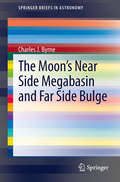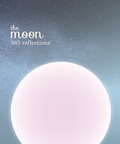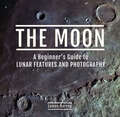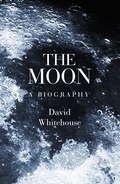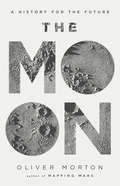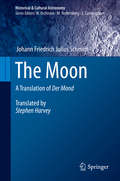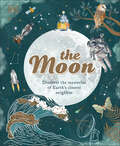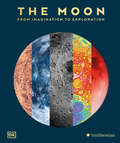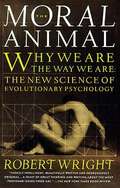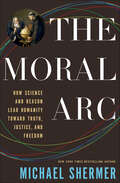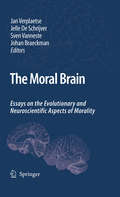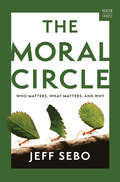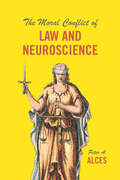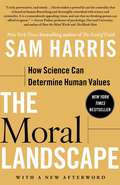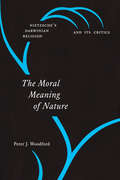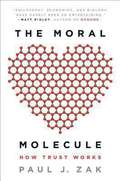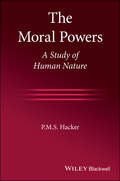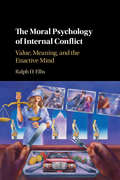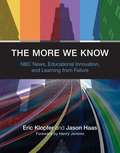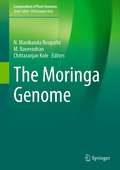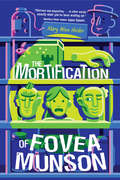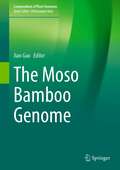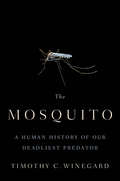- Table View
- List View
The Moon's Near Side Megabasin and Far Side Bulge
by Charles ByrneSince Luna and Lunar Orbiter photographed the far side of the Moon, the mysterious dichotomy between the face of the Moon as we see it from Earth and the side of the Moon that is hidden has puzzled lunar scientists. As we learned more from the Apollo sample return missions and later robotic satellites, the puzzle literally deepened, showing asymmetry of the crust and mantle, all the way to the core of the Moon. This book summarizes the author's successful search for an ancient impact feature, the Near Side Megabasin of the Moon and the extensions to impact theory needed to find it. The implications of this ancient event are developed to answer many of the questions about the history of the Moon.
The Moon: 365 reflections
by PyramidThroughout history, legend and myth, the Moon has symbolized immortality and eternity, enlightenment and adventure and has inspired poets, philosophers, astronomers and artists. Reflections upon the Moon from literature, philosophy, science and ancient wisdom are gathered together in this enchanting collection.
The Moon: A Beginner’s Guide to Lunar Features and Photography
by James Harrop“A must-have for anybody interested in lunar photography. If you are a beginner, this is the only lunar observing book you will ever need.” —BBC Sky at Night MagazineThis is a practical guide aimed at beginners interested in learning about the Moon and how to image our closest satellite neighbor. The book contains the complete photographic process including equipment, settings, capture techniques, stacking and image processing, each of which is vitally important to producing a good image. The information is laid out in a visual and easy-to-understand format so that even the dark art of image processing will not seem quite so daunting. There are many high-quality color photos of the Moon to help you learn about different lunar features and a list of 100 lunar targets identified as a challenge for you to find. All the targets have been captured by the author who provides a brief description of each feature and where it is located on the lunar surface. You will be surprised to discover the fine level of lunar detail which you can see from your back garden and once you start imaging, you will realize there is more to the Moon than meets the eye.“Although this book uses the Moon as a starting point, the wisdom it imparts can be applied to many different areas of astrophotography, including how to use planetary imaging preprocessing for crystal-clear images. Whether you’ve never picked up a camera before or you’re looking to get a few tips and tricks, this book is a great addition to your photography library.” —How it Works
The Moon: A Biography
by David WhitehouseIn The Moon David Whitehouse explains how our nearest celestial neighbor was created (and what moonrocks tell us of its earth-shattering origins), and how its existence may have been a crucial factor in mankind being here at all. Whitehouse discusses how man has related to it, worshipped it and blamed it for his own 'lunacy' - though can it really affect our behavior? He tells how the first person to look at the moon through a telescope was not Galileo, as is commonly believed, but an Englishman who knew Shakespeare and had a part in the Gunpowder Plot.While some of the story of the modern moon race may be known, the first moon race to map its surface has not been charted before, and is one of the most dramatic and unexpected stories in science. The recent discovery of ice hidden in the moon's polar regions opens up new possibilities for space travel that mean it is essential that mankind returns there if we are ever to journey to the rest of the solar system.
The Moon: A Biography
by Dr David WhitehouseIn The Moon David Whitehouse explains how our nearest celestial neighbor was created (and what moonrocks tell us of its earth-shattering origins), and how its existence may have been a crucial factor in mankind being here at all. Whitehouse discusses how man has related to it, worshipped it and blamed it for his own 'lunacy' - though can it really affect our behavior? He tells how the first person to look at the moon through a telescope was not Galileo, as is commonly believed, but an Englishman who knew Shakespeare and had a part in the Gunpowder Plot.While some of the story of the modern moon race may be known, the first moon race to map its surface has not been charted before, and is one of the most dramatic and unexpected stories in science. The recent discovery of ice hidden in the moon's polar regions opens up new possibilities for space travel that mean it is essential that mankind returns there if we are ever to journey to the rest of the solar system.
The Moon: A History for the Future (Economist Books)
by Oliver Morton The EconomistAn intimate portrait of the Earth's closest neighbor--the Moon--that explores the history and future of humankind's relationship with itEvery generation has looked towards the heavens and wondered at the beauty of the Moon. Fifty years ago, a few Americans became the first to do the reverse--and shared with Earth-bound audiences the view of their own planet hanging in the sky instead.Recently, the connection has been discovered to be even closer: a fragment of the Earth's surface was found embedded in a rock brought back from the Moon. And astronauts are preparing to return to the surface of the Moon after a half-century hiatus--this time to the dark side.Oliver Morton explores how the ways we have looked at the Moon have shaped our perceptions of the Earth: from the controversies of early astronomers such as van Eyck and Galileo, to the Cold War space race, to the potential use of the Moon as a stepping stone for further space exploration.Advanced technologies, new ambitions, and old dreams mean that men, women, and robots now seem certain to return to the Moon. For some, it is a future on which humankind has turned its back for too long. For others, an adventure yet to begin.
The Moon: A Translation of Der Mond (Historical & Cultural Astronomy)
by Johann Friedrich SchmidtJulius Schmidt was one of the finest astronomical observers of his time, and his detailed map of the Moon surpassed anything that had come before. Today, the German astronomer and geophysicist has remained a largely neglected figure, despite being one of the most important players in the history of lunar studies. This book at last makes accessible Schmidt’s highly regarded German work, Der Mond. Considered an astronomical classic of the nineteenth century, Der Mond remained without a proper English counterpart for the last century and a half, until now. The author’s faithful English translation provides readers with much-needed access into Schmidt’s original publication, with the aim of showing the community just how vital his work and legacy have been in the international field of selenography.
The Moon: Discover the Mysteries of Earth's Closest Neighbour (Space Explorers)
by Dr. Sanlyn Buxner Pamela Gay Georgiana KramerDiscover the mysteries of Earth&’s closest neighbor in this incredible guide to the Moon. This charming book is the perfect introduction for young readers who want to learn about every aspect of the moon. The Moon features breakdowns of the Moon&’s formation and geography, the lunar phases, a history of NASA&’s Apollo missions, the Moon&’s effect on Earth&’s tides and nocturnal animals, recent scientific discoveries, and so much more!This fascinating guide introduces 7-9 year olds to the moon&’s past, present, and future, through stunning illustrations, photographs, and fascinating information. Packed with mind-blowing facts, this incredible book of the moon is perfect for space lovers everywhere. Explore this wonderful book about the moon, featuring:- In-depth information, backed up by space photography, probe images, illustrations, and fun diagrams- Stunning, dreamy illustrations, making this title a perfect gift, as well as a solid reference book - Easy-to-digest sections, each filled with incredible facts and visuals- The entire subject of the Moon – including its formation and geography, the lunar phases, a history of NASA&’s Apollo missions, its effect on Earth&’s tides and nocturnal animals, plenty of recent scientific discoveries, and more!Boasting beautiful illustrations by artist Dawn Cooper, combined with up-to-date images from space agencies such as NASA and ESA, info panels, timelines, and diagrams, that help demystify and explain the wonder of the Moon, this is the perfect book for young readers.
The Moon: From Imagination to Exploration
by DKThe Moon has been an object of fascination for religions, cultures, and societies the world over since the dawn of humanity. The Moon is a beautifully illustrated account of our lunar neighbor in all its guises: a guiding light in the night sky, the driver of oceanic tides and natural cycles, the subject of exhaustive scientific study, and an enduring influence in literature, art, and popular culture. Exploring theories for the Moon’s origins around 4.5 billion years ago, the book charts its influence on the calendar systems and mythologies of early societies, and its role in the invention of the telescope and the science-fiction genre. It tells the incredible story of the Cold War space race and the first Moon landings. Specially commissioned illustrations capture the Moon's phases and motions in vivid detail, while stunning photography and artefacts bring the rich history of lunar observation and exploration to life. The last chapter of the book features extensive coverage of NASA’s Artemis mission to return astronauts to the lunar landscape in 2026, paving the way for future missions to Mars. The book also includes a guide to observing the Moon, complete with annotated maps and profiles of key physical features such as Tycho Crater and the Sea of Tranquility. Straddling science, culture, and history across the world, The Moon is a captivating and richly informative celebration.
The Moral Animal: Why We Are, the Way We Are: The New Science of Evolutionary Psychology
by Robert WrightAre men literally born to cheat? Does monogamy actually serve women's interests? These are among the questions that have made The Moral Animal one of the most provocative science books in recent years. Wright unveils the genetic strategies behind everything from our sexual preferences to our office politics--as well as their implications for our moral codes and public policies. Illustrations.From the Trade Paperback edition.
The Moral Arc: How Science and Reason Lead Humanity Toward Truth, Justice, and Freedom
by Michael ShermerThe New York Times–bestselling author of The Believing Brains explores how science makes us better people.From Galileo and Newton to Thomas Hobbes and Martin Luther King, Jr., thinkers throughout history have consciously employed scientific techniques to better understand the non-physical world. The Age of Reason and the Enlightenment led theorists to apply scientific reasoning to the non-scientific disciplines of politics, economics, and moral philosophy. Instead of relying on the woodcuts of dissected bodies in old medical texts, physicians opened bodies themselves to see what was there; instead of divining truth through the authority of an ancient holy book or philosophical treatise, people began to explore the book of nature for themselves through travel and exploration; instead of the supernatural belief in the divine right of kings, people employed a natural belief in the right of democracy.In The Moral Arc, Shermer explains how abstract reasoning, rationality, empiricism, skepticism—scientific ways of thinking—have profoundly changed the way we perceive morality and, indeed, move us ever closer to a more just world.“Michael Shermer is a beacon of reason in an ocean of irrationality.” —Neil deGrasse Tyson“A memorable book, a book to recommend and discuss late into the night.” —Richard Dawkins“[A] brilliant contribution . . . Sherman’s is an exciting vision.” —Nature
The Moral Brain
by Johan Braeckman Jelle De Schrijver Jan Verplaetse Sven VannesteScientists no longer accept the existence of a distinct moral organ as phrenologists once did. A generation of young neurologists is using advanced technological medical equipment to unravel specific brain processes enabling moral cognition. In addition, evolutionary psychologists have formulated hypotheses about the origins and nature of our moral architecture. Little by little, the concept of a 'moral brain' is reinstated. As the crossover between disciplines focusing on moral cognition was rather limited up to now, this book aims at filling the gap. Which evolutionary biological hypotheses provide a useful framework for starting new neurological research? How can brain imaging be used to corroborate hypotheses concerning the evolutionary background of our species? In this reader, a broad range of prominent scientists and philosophers shed their expert view on the current accomplishments and future challenges in the field of moral cognition and assess how cooperation between neurology and evolutionary psychology can boost research into the field of the moral brain.
The Moral Circle: Who Matters, What Matters, and Why (A Norton Short)
by Jeff SeboA philosopher calls for a revolution in ethics, suggesting we expand our “moral circle” to include insects, AI systems, and even microbes. Today, human exceptionalism is the norm. Despite occasional nods to animal welfare, we prioritize humanity, often neglecting the welfare of a vast number of beings. As a result, we use hundreds of billions of vertebrates and trillions of invertebrates every year for a variety of purposes, often unnecessarily. We also plan to use animals, AI systems, and other nonhumans at even higher levels in the future. Yet as the dominant species, humanity has a responsibility to ask: Which nonhumans matter, how much do they matter, and what do we owe them in a world reshaped by human activity and technology? In The Moral Circle, philosopher Jeff Sebo challenges us to include all potentially significant beings in our moral community, with transformative implications for our lives and societies This book explores provocative case studies such as lawsuits over captive elephants and debates over factory-farmed insects, and compels us to consider future ethical quandaries, such as whether to send microbes to new planets, and whether to create virtual worlds filled with digital minds. Taking an expansive view of human responsibility, Sebo argues that building a positive future requires the shedding of human exceptionalism and radically rethinking our place in the world.
The Moral Conflict of Law and Neuroscience
by Peter A. AlcesLaw relies on a conception of human agency, the idea that humans are capable of making their own choices and are morally responsible for the consequences. But what if that is not the case? Over the past half century, the story of the law has been one of increased acuity concerning the human condition, especially the workings of the brain. The law already considers select cognitive realities in evaluating questions of agency and responsibility, such as age, sanity, and emotional distress. As new neuroscientific research comprehensively calls into question the very idea of free will, how should the law respond to this revised understanding? Peter A. Alces considers where and how the law currently fails to appreciate the neuroscientific revelation that humans may in key ways lack normative free will—and therefore moral responsibility. The most accessible setting in which to consider the potential impact of neuroscience is criminal law, as certain aspects of criminal law already reveal the naiveté of most normative reasoning, such as the inconsistent treatment of people with equally disadvantageous cognitive deficits, whether congenital or acquired. But tort and contract law also assume a flawed conception of human agency and responsibility. Alces reveals the internal contradictions of extant legal doctrine and concludes by considering what would be involved in constructing novel legal regimes based on emerging neuroscientific insights.
The Moral Landscape: How Science Can Determine Human Values
by Sam HarrisNew York Times bestselling author Sam Harris&’s first book, The End of Faith, ignited a worldwide debate about the validity of religion. In the aftermath, Harris discovered that most people—from religious fundamentalists to non-believing scientists—agree on one point: science has nothing to say on the subject of human values. Indeed, our failure to address questions of meaning and morality through science has now become the primary justification for religious faith.In this highly controversial book, Sam Harris seeks to link morality to the rest of human knowledge. Defining morality in terms of human and animal well-being, Harris argues that science can do more than tell how we are; it can, in principle, tell us how we ought to be. In his view, moral relativism is simply false—and comes at an increasing cost to humanity. And the intrusions of religion into the sphere of human values can be finally repelled: for just as there is no such thing as Christian physics or Muslim algebra, there can be no Christian or Muslim morality. Using his expertise in philosophy and neuroscience, along with his experience on the front lines of our “culture wars,” Harris delivers a game-changing book about the future of science and about the real basis of human cooperation.
The Moral Meaning of Nature: Nietzsche’s Darwinian Religion and Its Critics
by Peter J. WoodfordWhat, if anything, does biological evolution tell us about the nature of religion, ethical values, or even the meaning and purpose of life? The Moral Meaning of Nature sheds new light on these enduring questions by examining the significance of an earlier—and unjustly neglected—discussion of Darwin in late nineteenth-century Germany. We start with Friedrich Nietzsche, whose writings staged one of the first confrontations with the Christian tradition using the resources of Darwinian thought. The lebensphilosophie, or “life-philosophy,” that arose from his engagement with evolutionary ideas drew responses from other influential thinkers, including Franz Overbeck, Georg Simmel, and Heinrich Rickert. These critics all offered cogent challenges to Nietzsche’s appropriation of the newly transforming biological sciences, his negotiation between science and religion, and his interpretation of the implications of Darwinian thought. They also each proposed alternative ways of making sense of Nietzsche’s unique question concerning the meaning of biological evolution “for life.” At the heart of the discussion were debates about the relation of facts and values, the place of divine purpose in the understanding of nonhuman and human agency, the concept of life, and the question of whether the sciences could offer resources to satisfy the human urge to discover sources of value in biological processes. The Moral Meaning of Nature focuses on the historical background of these questions, exposing the complex ways in which they recur in contemporary philosophical debate.
The Moral Molecule: The Source of Love and Prosperity
by Paul J. ZakA Revolution in the Science of Good and EvilWhy do some people give freely while others are cold hearted?Why do some people cheat and steal while others you can trust with your life?Why are some husbands more faithful than others—and why do women tend to be more generous than men?Could they key to moral behavior lie with a single molecule?From the bucolic English countryside to the highlands of Papua New Guinea, from labs in Switzerland to his campus in Souther California, Dr. Paul Zak recounts his extraordinary stories and sets out, for the first time, his revolutionary theory of moral behavior. Accessible and electrifying, The Moral Molecule reveals nothing less than the origins of our most human qualities—empathy, happiness, and the kindness of strangers. .
The Moral Powers: A Study of Human Nature
by P. M. HackerA milestone in the study of value in human life and thought, written by one of the world’s preeminent living philosophers The Moral Powers: A Study of Human Nature is a philosophical investigation of the moral potentialities and sensibilities of human beings, of the meaning of human life, and of the place of death in life. It is an essay in philosophical anthropology: the study of the conceptual framework in terms of which we think about, speak about, and investigate homo sapiens as a social and cultural animal. This volume examines the diversity of values in human life and the place of moral value within the varieties of values. Its subject is the nature of good and evil and our propensity to virtue and vice. Acting as the culmination of five decades of reflection on the philosophy of mind, epistemology, ethics, and human nature, this volume: Concludes Hacker’s acclaimed Human Nature tetralogy: Human Nature: The Categorial Framework, The Intellectual Powers: A Study of Human Nature, and The Passions: A Study of Human Nature Discusses traditional ideas about ethical value and addresses misconceptions held by philosophers, psychologists, and cognitive neuroscientists The Moral Powers: A Study of Human Nature is required reading philosophers of mind, ethicists, psychologists, cognitive neuroscientists, and any general reader wanting to understand the nature of value and the place of ethics in human lives.
The Moral Psychology of Internal Conflict
by Ralph D. EllisPushing back against the potential trivialization of moral psychology that would reduce it to emotional preferences, this book takes an enactivist, self-organizational, and hermeneutic approach to internal conflict between a basic exploratory drive motivating the search for actual truth, and opposing incentives to confabulate in the interest of conformity, authoritarianism, and cognitive dissonance, which often can lead to harmful worldviews. The result is a new possibility that ethical beliefs can have truth value and are not merely a result of ephemeral altruistic or cooperative feelings. It will interest moral and political psychologists, philosophers, social scientists, and all who are concerned with inner emotional conflicts driving ethical thinking beyond mere emotivism, and toward moral realism, albeit a fallibilist one requiring continual rethinking and self-reflection. It combines 'basic emotion' theories (e. g. Panksepp) with hermeneutic depth psychology. The result is a realist approach to moral thinking emphasizing coherence rather than foundationalist theory of knowledge.
The More We Know
by Eric Klopfer Jason HaasIn 2006, young people were flocking to MySpace, discovering the joys of watching videos of cute animals on YouTube, and playing online games. Not many of them were watching network news on television; they got most of their information online. So when NBC and MIT launched iCue, an interactive learning venture that combined social networking, online video, and gaming in one multimedia educational site, it was perfectly in tune with the times. iCue was a surefire way for NBC to reach younger viewers and for MIT to test innovative educational methods in the real world. But iCue was a failure: it never developed an audience and was canceled as if it were a sitcom with bad ratings. In The More We Know, Eric Klopfer and Jason Haas, both part of the MIT development team, describe the rise and fall of iCue and what it can teach us about new media, old media, education, and the challenges of innovating in educational media. Klopfer and Haas show that iCue was hampered by, among other things, an educational establishment focused on "teaching to the test," television producers uncomfortable with participatory media, and confusion about the market. But this is not just a cautionary tale; sometimes more can be learned from an interesting failure than a string of successes. Today's educational technology visionaries (iPads for everyone!) might keep this lesson in mind.
The Moringa Genome (Compendium of Plant Genomes)
by Chittaranjan Kole N. Manikanda Boopathi M. RaveendranThis book provides updated and all-inclusive data and evidences for Moringa botany, cytogenetical analysis, genetic resources and diversity, classical genetics, traditional breeding, tissue culture, genetic transformation, whole-genome sequencing, comparative genomics and elucidation on applications of functional genomics, nanotechnology, bioinformatics, processing and value addition besides providing perspectives of medicinal and therapeutic properties of Moringa. Moringa gained global attention in the recent past owing to its unique blend of affordable nutraceutical and pharmaceutical compounds in all parts of the plants. Scientific literatures supporting its health benefits besides the studies on its utility in various fields are scattered on several reports. This book is written by renowned global subject experts by compiling and narrating it in a sober style.
The Morphology of Human Blood Cells (Seventh Edition)
by Ann Bell Sabah SallahThe book portrays the morphologic characteristics of normal and pathologic cells in blood and bone marrow. It will benefit medical students, student medical technologists, and other health science students who are learning to identify the various types of blood cells.
The Mortification of Fovea Munson
by Mary Winn HeiderFovea Munson is nobody's Igor. True, her parents own a cadaver lab where they perform surgeries on dead bodies. And yes, that makes her gross by association, at least according to everyone in seventh grade. And sure, Fovea's stuck working at the lab now that her summer camp plans have fallen through. But she is by no means Dr. Frankenstein's snuffling assistant!That is, until three disembodied heads, left to thaw in the wet lab, start talking. To her. Out loud. What seems like a nightmare, or bizarre hallucination, is not. Fovea is somebody's Igor, all right. Three somebodies, actually. And they need a favor.With a madcap sense of humor and a lot of heart (not to mention other body parts), this is a story about finding oneself, finding one's friends, and embracing the moment.
The Moso Bamboo Genome (Compendium of Plant Genomes)
by Jian GaoThis book is the first comprehensive compilation describing the botanical traits, genetic resources, whole genome sequencing, Mitochondrial genome, transcriptomes of different organs with developmental stages, transcription factors, delineating gene evolution of gene family in Bambusoideae, alternative splicing (AS) and polyadenylation, case studies for economically important traits such as internode length, shoot fast growing, flowering, ageing and stress-resistant genes and small RNAs-mediated gene regulation of moso bamboo flowering and other developmental stages. Applications of transcriptome and genome approaches in moso bamboo in general and the prospects of transgenic breeding and genome editing technologies in bamboo are also discussed. Altogether, the book comprises eleven chapters covered over 200 pages authored by the researchers involved in genomic science, molecular biology, and breeding. This book appeals to graduate students, post-graduate students, research scholars, researchers, and industry players in the field of plantation bamboo in general, bamboo processing and bamboo garden owner and fans of bamboo culture in particular.
The Mosquito: A Human History of Our Deadliest Predator
by Timothy C. WinegardA pioneering and groundbreaking work of narrative nonfiction that offers a dramatic new perspective on the history of humankind, showing how through millennia, the mosquito has been the single most powerful force in determining humanity’s fate Why was gin and tonic the cocktail of choice for British colonists in India and Africa? What does Starbucks have to thank for its global domination? What has protected the lives of popes for millennia? Why did Scotland surrender its sovereignty to England? What was George Washington's secret weapon during the American Revolution? The answer to all these questions, and many more, is the mosquito. Across our planet since the dawn of humankind, this nefarious pest, roughly the size and weight of a grape seed, has been at the frontlines of history as the grim reaper, the harvester of human populations, and the ultimate agent of historical change. As the mosquito transformed the landscapes of civilization, humans were unwittingly required to respond to its piercing impact and universal projection of power. The mosquito has determined the fates of empires and nations, razed and crippled economies, and decided the outcome of pivotal wars, killing nearly half of humanity along the way. She (only females bite) has dispatched an estimated 52 billion people from a total of 108 billion throughout our relatively brief existence. As the greatest purveyor of extermination we have ever known, she has played a greater role in shaping our human story than any other living thing with which we share our global village. Imagine for a moment a world without deadly mosquitoes, or any mosquitoes, for that matter? Our history and the world we know, or think we know, would be completely unrecognizable. Driven by surprising insights and fast-paced storytelling, The Mosquito is the extraordinary untold story of the mosquito’s reign through human history and her indelible impact on our modern world order.
